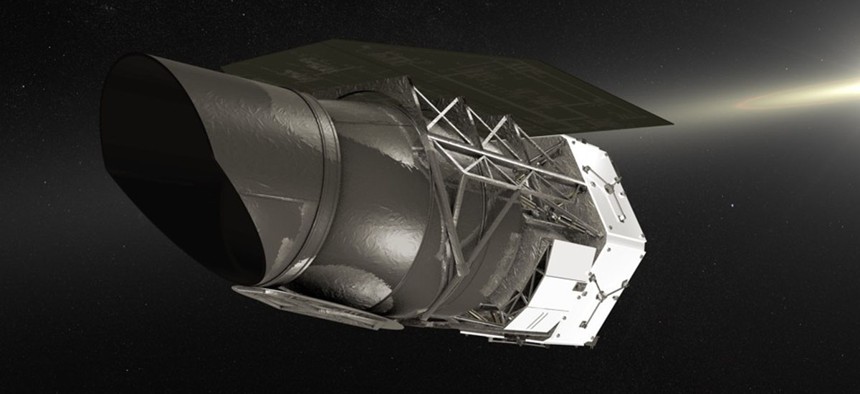The NASA Space Telescope Trump Wants to Cancel

An illustration of NASA’s Wide-Field Infrared Survey Telescope (WFIRST), planned to fly in the mid-2020s. NASA Goddard Spaceflight Center.
The president’s budget proposal has some troubling news for the space agency’s next big astronomy mission.
The Trump administration has released its budget proposal for fiscal year 2019 and put dozens of federal programs on the chopping block, including a brand-new nasa space telescope that scientists say would provide the biggest picture of the universe yet, with the same sparkling clarity as the Hubble Space Telescope.
The proposal, released Monday, recommends eliminating the Wide-Field Infrared Survey Telescope (WFIRST), citing “higher priorities” at nasa and the cost of the new telescope.
“Given competing priorities at nasa, and budget constraints, developing another large space telescope immediately after completing the $8.8 billion James Webb Space Telescope is not a priority for the administration,” the proposal states. “The budget proposes to terminate WFIRST and redirect existing funds to other priorities of the science community, including completed astrophysics missions and research.”
The James Webb Space Telescope is a nasa telescope that’s almost ready to go after two decades of work. The Webb is expected to launch in 2019 to a point 1 million miles from Earth, where it will study the cosmos in infrared light and provide images and data using a mirror far bigger than the one on Hubble, which launched in 1990. WFIRST is in line after Webb as nasa’s next flagship astronomy mission, and is currently in early stages of design and development. The mission would launch sometime in the mid-2020s.
Rumors had swirled about the Trump administration’s outlook on WFIRST for about a month. Robert Lightfoot, the acting administrator of nasa, mentioned the cancellation of WFIRST on Monday when he said the agency made some “hard decisions,” about its budget but he did not elaborate or say where WFIRST’s fundings would be redirected. More than a year after Trump took office, NASA remains without an official, Senate-approved administrator. Trump nominated a candidate last fall—Jim Bridenstine—who, unsurprisingly, Republicans support and Democrats loathe, but he is still in limbo. Spergel said he suspects plans for nasa’s long-term goals are coming mostly from the National Space Council, an advisory board that was last active in 1989 and which the Trump administration resurrected last year. So far, the council, helmed by Vice President Mike Pence, has expressed interest in lunar and near-Earth missions and made no mention of the kind of astrophysical research WFIRST would conduct.
Trump’s budget request doesn’t actually affect WFIRST operations. In an email to WFIRST staff Monday, obtained by The Atlantic, Paul Hertz, the director of nasa’s astrophysics division, told everyone to keep working.“For the remainder of this year, while the Congress considers this proposal from the president, the WFIRST project will continue making progress with the FY 2018 budget allocation consistent with congressional direction,” Hertz wrote. “Maintaining progress against the existing plan is the only way to preserve nasa’s ability to deliver the mission on time and meet the established cost target, should Congress decide not to accept the president’s proposal to terminate WFIRST.”
Hertz sought to reassure WFIRST staff. “This proposal is not a reflection on the importance of WFIRST to nasa or on the quality of work done to date,” he said. He closed the memo by thanking the WFIRST team “for the hard work that you are doing, and will continue to do, on WFIRST, especially during these uncertain times.”
So the work will continue, but not completely unaffected. Spergel worries the White House’s budget proposal will scare off people who want to work on WFIRST as development continues. “One of the challenges is going to be making sure that we continue to get the top scientists and engineers involved in the project,” he said. “When something like this happens, you don’t want people feeling the project’s failing.”
The latest news also risks hurting the morale of the current staff. “I’m hopeful that people’s response will be to fight for the mission, fight for the science, rather than bail out,” Spergel said.






